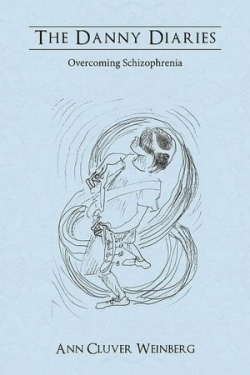The Danny Diaries
Overcoming Schizophrenia
The Danny Diaries is a cautionary tale for any parent dealing with a case of suspected mental illness in a child.
Author Ann Cluver Weinberg, who calls herself Lucy in this memoir, is Danny’s mother. She also uses fictitious names for other immediate family members.
Though born in London, Danny’s upbringing takes place mostly in Johannesburg, South Africa. To compose her story, Weinberg relies in part on a diary she kept on Danny, as is suitable to her background as a biographer, poet and author of short stories. Her work has appeared in the magazines Sesame and Frontline.
Weinberg opens the book with a history of the nuclear family, but a more attention-getting beginning could have been to explain how mistaken she and her husband were in thinking that parenting would be easy, or to describe an episode relating to Danny’s psychosis.
As Weinberg explains, a single use of LSD and repeated marijuana use may have initiated Danny’s first breakdown at age fifteen. Further incidences led to multiple treatments and schools—including Tara, an inpatient treatment facility. Danny undergoes psychotherapy and takes anti-psychotic medications for a time but improvement is gradual and fluctuating.
This well-organized book takes a mainly chronological approach. The titles of most of the chapters indicate a portion of Danny’s life, such as “St Martin’s School (Aged Sixteen, 1983).”
The extensive details about symptoms in The Danny Diaries will enable parents who have a mentally ill teenager to make comparisons with Danny. For example, she writes, “Danny said gloomily, ‘At Tara even the furthest walls were talking about me.’”
Parents considering the tough love approach of requiring children to undergo urine testing for drugs, as Danny’s mother does, will learn that they are not necessarily the answer. The fact that Danny goes for a test and legitimately can’t provide a specimen, but is free of signs of drug use, offers a red flag that there can be a serious downside to these tests.
In this book, readers will gain some knowledge about twentieth century South Africa, including racial segregation. They’ll also encounter South African and British words that may be unfamiliar to American readers. Weinberg defines some, such as “dagga,” which means marijuana. Explaining more of these words would have been helpful. Abbreviations lack periods, and readers will notice some sentence fragments as well.
However, The Danny Diaries succeeds in demonstrating how a mixture of mental illness and drug problems can make diagnosis and treatment complicated. It’s a lesson in the importance of parents knowing their kids well, evaluating the advice that they get from experts and then following their best instincts.
Reviewed by
Norma D. Kellam
Disclosure: This article is not an endorsement, but a review. The publisher of this book provided free copies of the book and paid a small fee to have their book reviewed by a professional reviewer. Foreword Reviews and Clarion Reviews make no guarantee that the publisher will receive a positive review. Foreword Magazine, Inc. is disclosing this in accordance with the Federal Trade Commission’s 16 CFR, Part 255.

